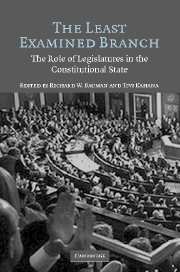Book contents
- Frontmatter
- Contents
- Foreword: Legislatures in the Constitutional State by Amy Gutmann
- Contributors
- New Ways of Looking at Old Institutions
- PART ONE LEGISLATURES AND DEMOCRATIC THEORY
- PART TWO LEGISLATING AND DELIBERATING IN THE DEMOCRATIC LEGISLATURE
- 5 Legislative Judgment and the Enlarged Mentality: Taking Religious Perspectives
- 6 Should We Value Legislative Integrity?
- 7 Nondelegation Principles
- 8 Vox Populi: Populism, the Legislative Process, and the Canadian Constitution
- PART THREE CONSTITUTION MAKING BY LEGISLATURES: THE EXPLICIT VERSION
- PART FOUR CONSTITUTION MAKING BY LEGISLATURES: THE IMPLICIT VERSION
- PART FIVE CONSTITUTIONAL INTERPRETATION AND APPLICATION BY THE LEGISLATURE
- PART SIX IS LEGISLATIVE CONSTITUTIONALISM POSSIBLE?
- PART SEVEN THE LEGISLATURE IN DIALOGUE: DOMESTIC AND INTERNATIONAL CONTEXTS
- Index
5 - Legislative Judgment and the Enlarged Mentality: Taking Religious Perspectives
Published online by Cambridge University Press: 06 August 2009
- Frontmatter
- Contents
- Foreword: Legislatures in the Constitutional State by Amy Gutmann
- Contributors
- New Ways of Looking at Old Institutions
- PART ONE LEGISLATURES AND DEMOCRATIC THEORY
- PART TWO LEGISLATING AND DELIBERATING IN THE DEMOCRATIC LEGISLATURE
- 5 Legislative Judgment and the Enlarged Mentality: Taking Religious Perspectives
- 6 Should We Value Legislative Integrity?
- 7 Nondelegation Principles
- 8 Vox Populi: Populism, the Legislative Process, and the Canadian Constitution
- PART THREE CONSTITUTION MAKING BY LEGISLATURES: THE EXPLICIT VERSION
- PART FOUR CONSTITUTION MAKING BY LEGISLATURES: THE IMPLICIT VERSION
- PART FIVE CONSTITUTIONAL INTERPRETATION AND APPLICATION BY THE LEGISLATURE
- PART SIX IS LEGISLATIVE CONSTITUTIONALISM POSSIBLE?
- PART SEVEN THE LEGISLATURE IN DIALOGUE: DOMESTIC AND INTERNATIONAL CONTEXTS
- Index
Summary
Hannah Arendt outlined a preliminary theory of judgment in her lectures at the New School and in various essays. But she did not live to write the volume she had planned on judgment as the final volume to her work on thinking and willing. In my earlier work, I have built upon her theory of judgment, primarily by looking at its implications for judgment in the judicial context. Here, I return to her own primary interest, political judgment. In this chapter, I look at the importance of judgment for two of the central functions of the legislature in a constitutional state: the legislature as a locus of collective deliberation about the common good and the legislature as a participant in the ongoing, dynamic, and contested definition of core constitutional values. These functions are, in turn, linked to a third issue: the link between the ordinary practices of citizens and what we can hope for from a legislature.
The central concept in Arendt's theory, which she borrowed from Kant, is the enlarged mentality. Briefly put, what distinguishes judgment from both subjective preference and provable truth claims is that judgment involves reflection on the question at hand from the standpoint or perspective of others. Judgment as such remains subjective; it cannot compel the assent of others as truth claims can. But it can claim validity with respect to other judging subjects. It is the use of the enlarged mentality, the consideration of others' perspectives, that makes this validity possible.
- Type
- Chapter
- Information
- The Least Examined BranchThe Role of Legislatures in the Constitutional State, pp. 93 - 124Publisher: Cambridge University PressPrint publication year: 2006
- 4
- Cited by



